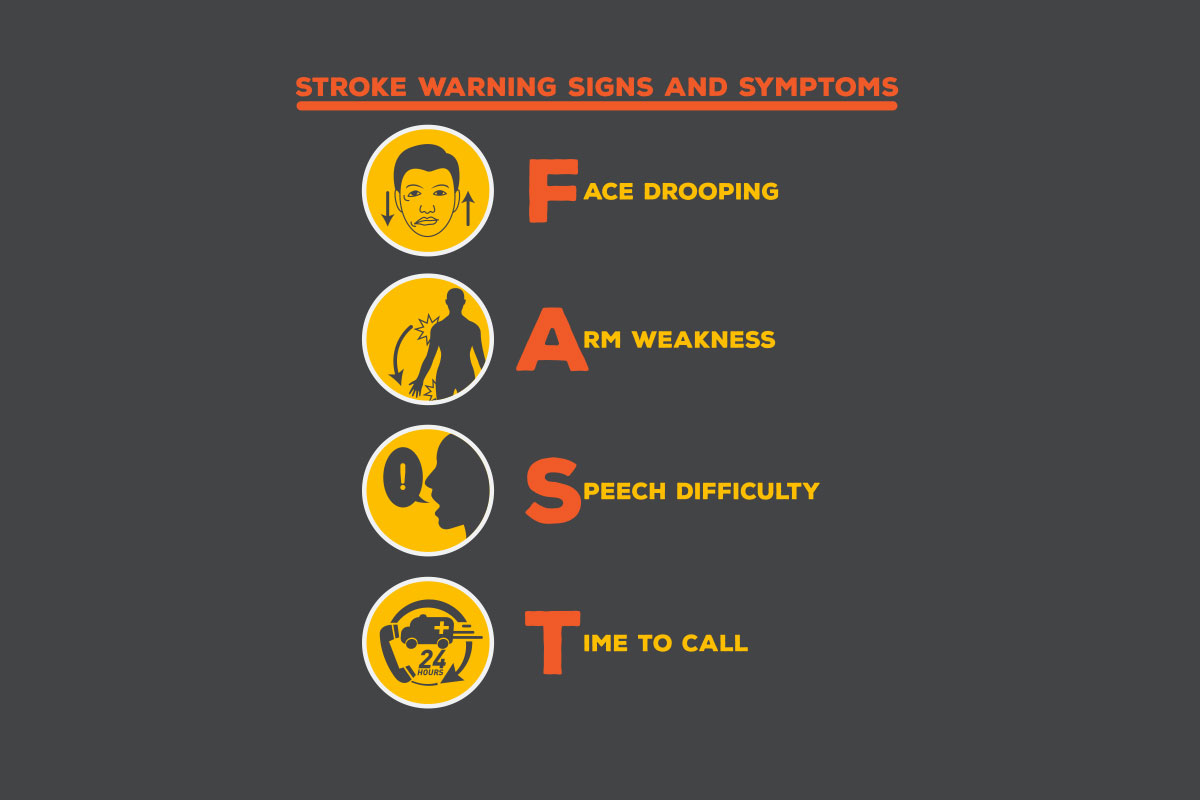Someone in the United States has a stroke every 40 seconds and someone dies from a stroke every four minutes, according to the American Stroke Association. The good news is 80 percent of strokes can be prevented by adopting a healthy lifestyle. Also, learning to recognize the signs and symptoms of stroke and calling 9-1-1 right away may save a life. The sooner a stroke is treated, the better the chances are of recovery.
UConn Health offers individualized, quality stroke care in collaboration with community emergency medical services. When a patient arrives at the UConn Health Emergency Department with stroke symptoms, the Stroke Team is already notified and waiting to provide a rapid diagnosis and treatment. This team is trained in the most up-to-date, evidence-based guidelines with the goal of ensuring a rapid response and coordinated care for the patient’s stroke recovery.

In addition to being a certified Primary Stroke Center, UConn Health was recently recognized by the American Heart Association and the American Stroke Association for its stroke team’s commitment to quality care for patients. The Get With The Guidelines®-Stroke Silver Plus Quality Achievement Award with Target: StrokeSM Honor Roll award recognizes UConn John Dempsey Hospital’s commitment and success ensuring that stroke patients receive the most appropriate treatment according to nationally recognized, research-based guidelines based on the latest scientific evidence.
During National Stroke Awareness Month, UConn Health stroke coordinator and registered nurse Jennifer Sposito discusses stroke risk factors, prevention, and treatment.
What Is a Stroke?
A stroke, sometimes called a brain attack, occurs when blood flow to the brain is interrupted by a blocked or burst blood vessel. It can happen in an instant and without warning.
- An ischemic stroke is caused by a clot that blocks blood flow to the brain. This is the most common type of stroke.
- A hemorrhagic stroke is caused when a blood vessel bursts in the brain.
- A transient ischemic attack (TIA) is as serious a medical emergency as an ischemic stroke. A TIA is a “mini” stroke, where the blockage by a clot is temporary and your symptoms resolve. Your risk of having a full stroke is very high, and you should seek medical attention immediately.
Who Is at Higher Risk for Stroke?
A stroke can happen at any age, however, conditions such as obesity, high blood pressure, diabetes, smoking, and irregular heartbeat can raise your risk for stroke. Also, African-Americans and Hispanics are at increased risk.
What Are the Warning Signs of a Stroke?
- Numbness or weakness of face arm and/or leg
- Facial droop
- Acute vision changes
- Difficulty in speaking
- Trouble in understanding simple statements
- Confusion
- Trouble in walking or maintaining balance
If you or someone else experiences any of the signs or symptoms, act F.A.S.T. to get lifesaving medical treatment.
What Does F.A.S.T. Stand For?
F.A.S.T. is an easy way to remember the sudden signs of stroke. When you can spot the signs, you’ll know to call 9-1-1 for help right away.
F—Face: Ask the person to smile. Does one side of the face droop?
A—Arms: Ask the person to raise both arms. Does one arm drift downward?
S—Speech: Ask the person to repeat a simple phrase. Is his or her speech slurred or strange?
T—Time: If you observe any of these signs, call 9-1-1 immediately.
Is a Stroke Preventable?
Yes by taking the following steps for a healthy lifestyle.
- Go to your primary care doctor routinely for blood pressure and wellness checks
- Do not smoke, and avoid second hand smoke
- Eat a healthy diet: Mediterranean diet is recommended
- Exercise
- Maintain a healthy weight
- Take all medication prescribed as directed
- Try to decrease stress in life
- Take up hobbies that help you relax
Can a Stroke Be Treated?
Stroke is treatable, but the most effective stroke treatments are only available if you recognize the symptoms of stroke and get to a hospital in time to get medical help. For some types of stroke, there is a three-hour window which a patient can be given a clot-busting drug called TPA that provides the best chances of recovering from a stroke.
UConn Health is hosting an Emergency Stroke Care Conference for health care professionals on Thursday, May 26, from 8 to 4:30 p.m. For more information or to register, call 800.535.6232.
To learn more about stroke care at UConn Health, visit health.uconn.edu/stroke-center.



